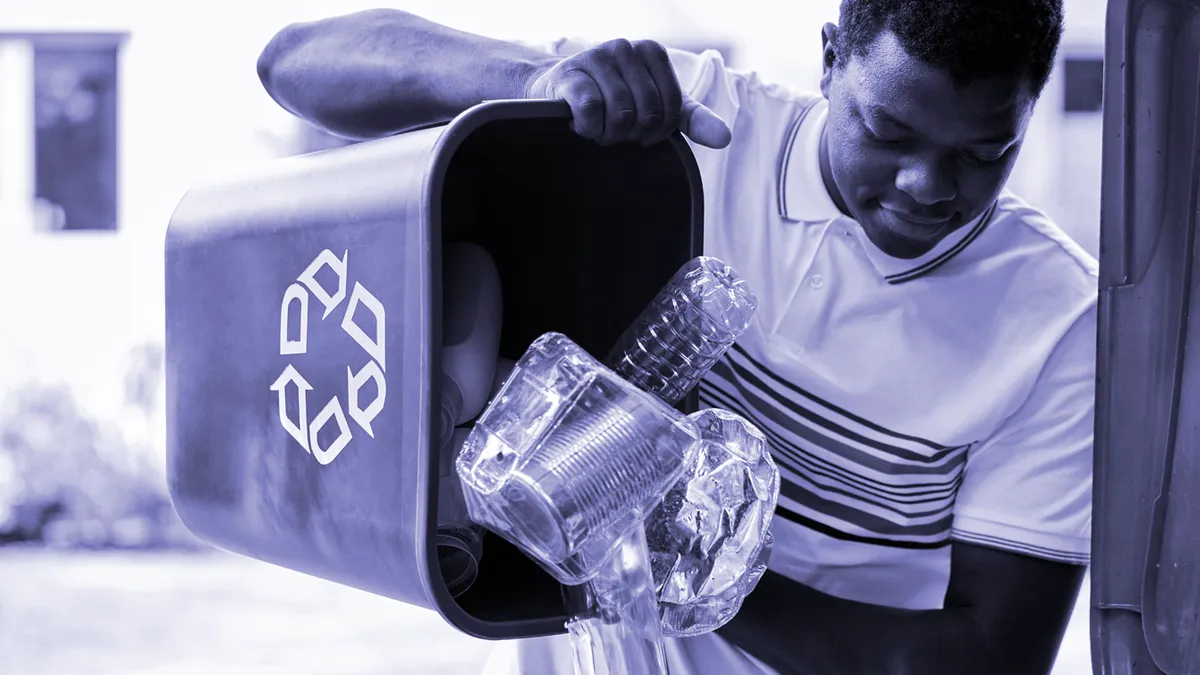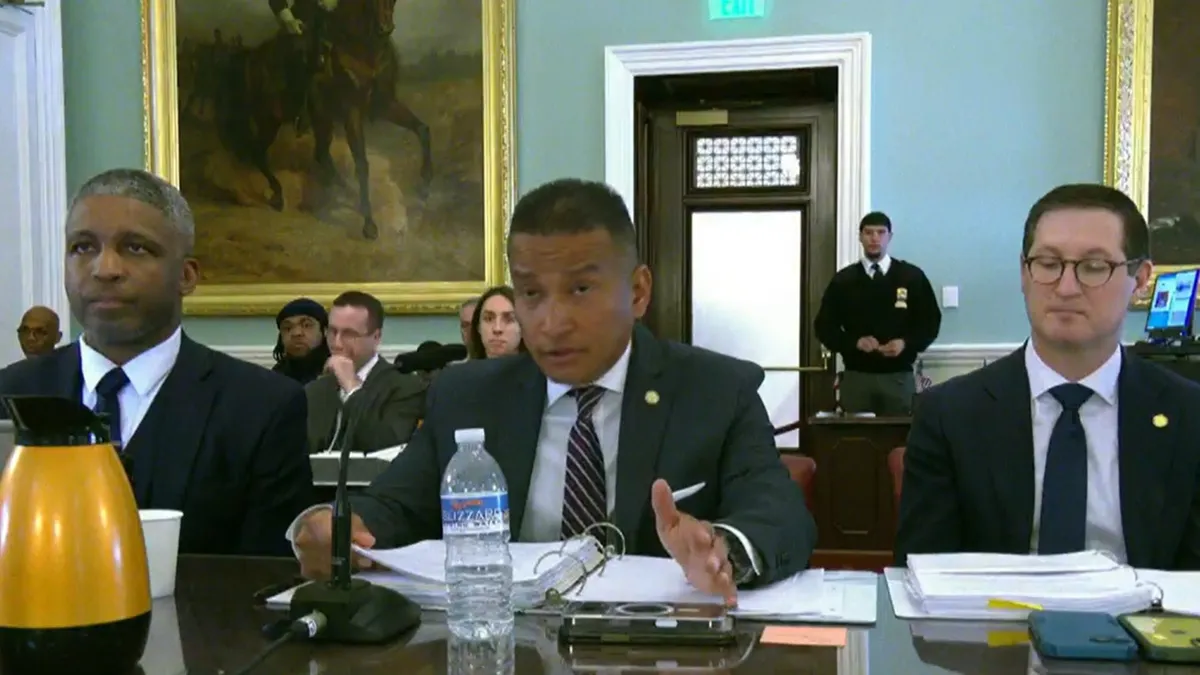City Haul is Waste Dive's ongoing series examining the people and issues shaping municipal waste and recycling across the U.S. Have a tip or an angle about city-run operations that you think should be part of the conversation? Please reach out to mrachal@industrydive.com.
City residents have a lot of questions about what can actually be recycled — just ask Washington, D.C. recycling social media sage Charlotte Dreizen.
Dreizen, a sustainability professional who recently completed a multiyear tenure as a program analyst in the D.C. Department of Public Works' Office of Waste Diversion, this year doubled down on regularly tweeting tips with photos on what can and cannot go in the blue bin. Soon, followers were sending in their own questions on vexing items (aluminum foil? toothpaste tubes? Amazon Prime packaging envelopes?) for Dreizen to retweet with a definitive answer.
"Never in a million years would I have guessed that people would be so interested," Dreizen said.
In DC, we’re lucky to be able to recycle rigid plastic containers like both of these. No need to clean out the container, small amounts of residual shampoo acts as soap in the recycling process and recyclers actually appreciate it!
— Charlotte Dreizen (@CharDreizen) November 23, 2021
But, the value of these two are *not* the same. pic.twitter.com/SeI1I0jKaj
In recent memory, proper, contaminant-free recycling has never been totally simple, but confusion abounded in the aftermath of National Sword.
"Obviously that was damaging to recycling acutely for six, nine, 12 months, but I think what was so much more damaging about that is the perception that recycling doesn't happen or isn't working in the years since then," Dreizen said. "I think a lot of folks just haven't really departed from that narrative," she added, noting "a big disconnect" in how recycling is currently working in the U.S. and what people think is happening.
Many headlines and top news hits about recycling in recent years, particularly since changes to China accepting U.S. recyclables, have something in common: heavy skepticism. A sampling that a curious consumer and Googler might find:
- "Is Recycling Worth It?" (Scientific American)
- "Does Your Recycling Actually Get Recycled? Yes. Maybe. It Depends." (Washington, D.C.'s NPR affiliate)
- "Recycling in the U.S. Is Broken. How Do We Fix It?" (Columbia Climate School)
- "How Useful is Recycling, Really?" (The Atlantic)
"I have lots of young smart, professional friends who are very climate-conscious, and they don't think recycling is happening," Dreizen said. "If more environmentally conscious engaged folks aren't believing it, I can't even imagine what the average household, whether in an urban area or a rural one, is thinking."
Dreizen said that while she doesn't know the best way to combat it, it seemed like a good way to try was in providing "more, better information and to really own up to where recycling doesn't work well."
Certainly, nuanced conversations about recycling — its benefits, limitations and misunderstandings — are important. But that doesn’t make the job of encouraging proper recycling easy, especially in communities with diversity in housing types, service providers, languages and levels of enthusiasm or engagement on recycling.
One strike against the perceived value of recycling was the dearth of markets in the aftermath of National Sword. But today, data points to commodity prices on the rise. The Solid Waste Association of North America published a report in November on market recovery, asserting that "the prices and demand for recyclables from municipal curbside recycling programs have rebounded and are close to record highs in the United States and Canada."
Local connections and transparency
But when it comes to how positive valuations relate to influencing consumers, not everyone wants to hang their hat on the recent upturn. Multiple leaders and experts are instead concentrating on consistent communication about the basics.
Elizabeth Schussler, The Recycling Partnership’s senior director of social change, behavior and impact, believes that focusing on economics is a “slippery slope, because the markets are always going to change.” Additionally, considering the value of a ton of material is not so familiar and meaningful to the average consumer.
Rather, it’s more productive to focus on habituating people to see the inherent value in recycling.
"In general, most people want a signal [that] it's worth their effort," Schussler said. "We need to get that core level of trust up." Trust comes from hearing things across multiple channels, she said, pointing to the 'seven touches' marketing rule. "So if you don't offer recycling communications to your residents ... saying nothing is saying something."
Bret Biggers, senior economist at the Institute of Scrap Recycling Industries, shared a similar sentiment. "The price of the commodity can fluctuate, and a single household does not influence the price of the commodity," he said. When it comes to consumer-oriented efforts, he said, time is better spent focusing on what should go into the bin and on good stewardship.
And Dreizen noted that "as big of a rebate as you can get back from your recycling, the better, to have a lower cost. But it's never going to be as cheap as landfilling something" and municipalities are never going to make a profit. "I think conveying that to folks helps alleviate some of that fixation."
On the other hand, tangible connections can make a difference in the eyes of consumers. Chattanooga, Tennessee, for instance, is home to facilities for Coca-Cola, as well as for paper company and MRF operator WestRock. While plastics Nos. 3-7 remain a sticking point, Director of Communications Mary Beth Ikard said the city's next campaign can emphasize to people "that we have good ways to repurpose your cardboard, your mixed paper, and your plastics [Nos. 1 and 2] locally. I think a lot of people will be curious to know that."
Particularly in fast-growing cities like Chattanooga, another notable local impact is how recycling can reduce the need for more landfill space.
"Growth means that eventually landfills will reach their capacity and have to be shuttered. And then that puts you in the position of trying to site another landfill, which usually increases costs," Ikard said. "So even though to run a recycling program it may be a little bit more expensive because of what's happening with these market trends ... you have to factor in if you have to take your trash to another landfill that's farther, [which would] increase costs for the municipality and therefore the taxpayer."
Numerous major cities have had changes to their recycling programs or disruptions to services, whether removing a certain stream from curbside pickup such as glass; transitioning from curbside pickup to drop-off sites altogether; or enforcing a days, weeks or months-long break to curbside pickup due to insufficient staffing.
Those changes can confuse residents about source-separation habits or pickup schedules, or worse, lead to loss of trust that their recyclables ever end up actually getting recycled. Last year in Cleveland, for example, local journalists spread the news that recyclables that residents were separating were being landfilled as the city was navigating next steps for its recycling program.
In some areas, leaders think not focusing on changes can be a more strategic approach. Lisa Rapp is public works director in Lakewood, California, located in Los Angeles County. She described Lakewood's population as largely made up of "environmentalists." She said that while some cities opted to ask residents to only sort plastic Nos. 1 and 2 in the aftermath of National Sword in a bid to address contamination issues, Lakewood did not go that route.
"We chose instead to collect and not confuse the residents by saying 'this is good, put this in, but don't put that in anymore' because we felt like when we were able to recover more of those recyclables, then it would be a harder lift to get them to go back to putting those in the recycling carts," Rapp said. "We haven't gotten a lot of blowback back from our residents about 'oh, we're being asked to do this and it's going in the landfill anyway.'"
In Schussler's view, in a city that may have had to landfill some recyclables or cancel a program, "I think that the residents want heartfelt, authentic explanation and commitment from their leadership. And then they also want some sort of ongoing signals of, 'keep it up. We're in this with you.'" And if the time comes when a municipality is able to restore service, it's "a PR opportunity, because it really is signaling that bringing it back really is important," she said.






















